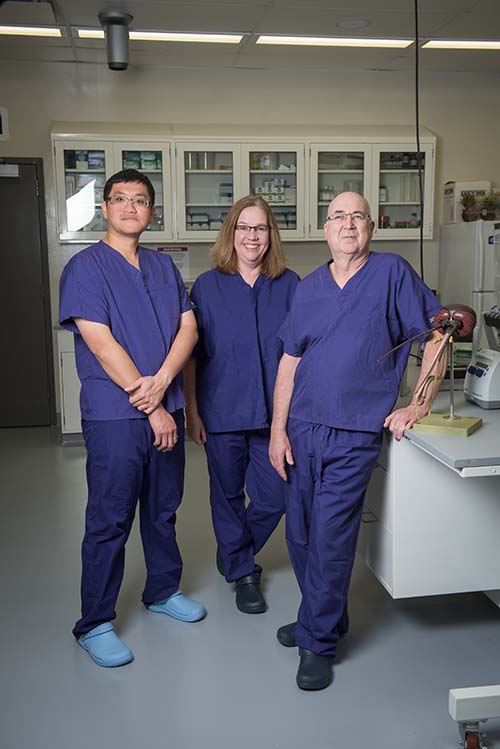February 22, 2022
K-State researchers receive international award in biomedicine

Three researchers from Kansas State University have received the BIAL Award in Biomedicine for a publication focused on mRNA technology, which is now used in the two vaccines approved by the Food and Drug Administration to prevent COVID-19.
The award recognizes the work of a team including Stephen Higgs, associate vice president for research and director of the Biosecurity Research Institute; and Yan-Jang "Scott" Huang, research assistant professor of arbovirology and Dana Vanlandingham, professor of arbovirology, both in the College of Veterinary Medicine at K-State. The team was comprised of 36 co-authors, including researchers from Duke University, Harvard Medical School, National Institutes of Health and several private companies.
"It is a tremendous honor for the three of us at K-State to share this award that exemplifies the power and importance of collaborative research by so many researchers at so many institutes," Higgs said. "We are indebted to the BIAL Foundation and to Drew Weissman who spearheaded the innovative research and assembled the team."
The winning work was chosen from 47 papers nominated among the most important research reports in the last 10 years in biomedicine. Applications included basic research studies, clinical trials, work in neurodegenerative disorders, cancer and infectious diseases. The award is worth $339,522 and aims to distinguish a work in biomedicine of exceptional quality and scientific relevance.
The award recognizes an important breakthrough of a technology for vaccine creation, published in Nature in 2017 in the research report "Zika virus protection by a single low-dose nucleoside-modified mRNA vaccination." The paper describes the complex work to engineer an mRNA vaccine to treat a disease and demonstrates its efficacy.
While traditional vaccines often use a modified virus to provoke a reaction in the immune system, the technology investigated by the award-winning team uses a synthetic mRNA to allow the body to prepare itself against the disease. To do so, it uses an mRNA that makes the body’s own cells synthesize a viral protein that stimulates the body's immune response.
The pandemic caused by SARS-CoV-2 has accelerated research in this area, but this work paves the way for a new generation of vaccines with the potential to revolutionize the treatment of many diseases.
"This work by Drs. Higgs, Vanlandingham, Huang and their colleagues represents an incredible achievement in the biomedical field," said David Rosowsky, vice president for research. "This research was possible, in part, due to the unique laboratories and expertise at the Biosecurity Research Institute, a premier research facility at Kansas State University. I congratulate our colleagues on this latest international recognition and look forward to their continued discoveries and scientific contributions as members of K-State's distinguished faculty."
